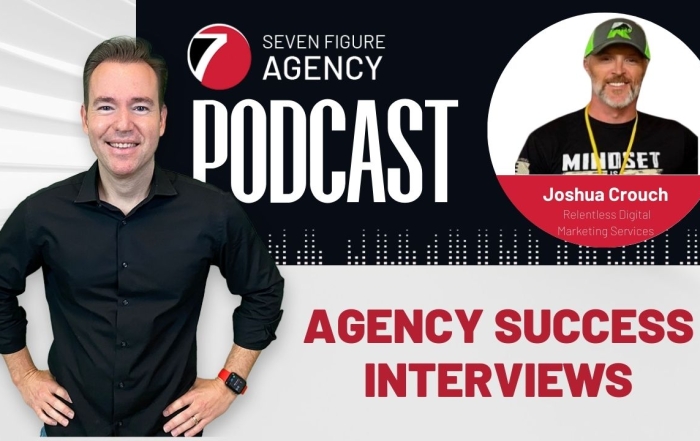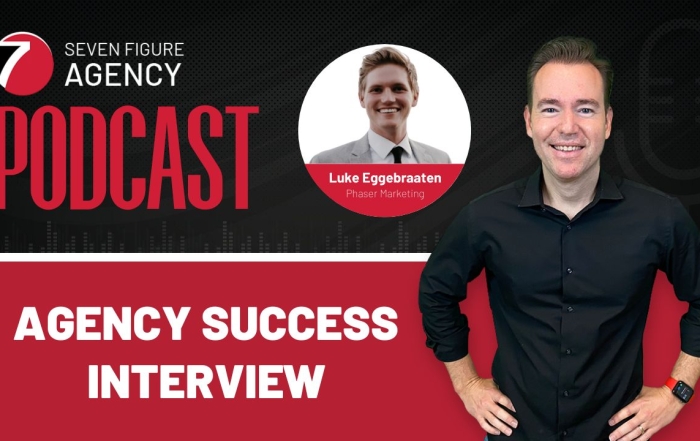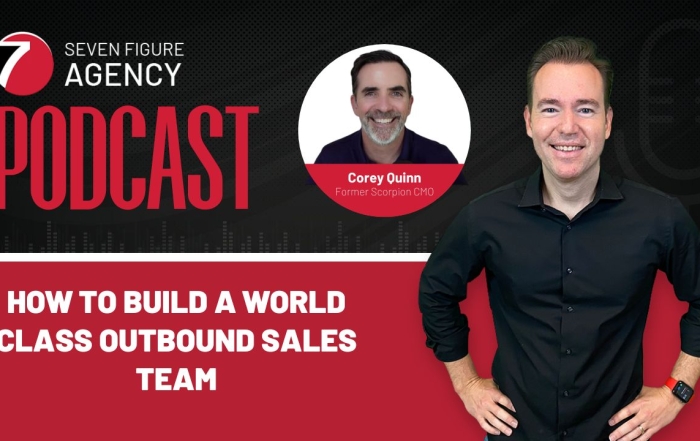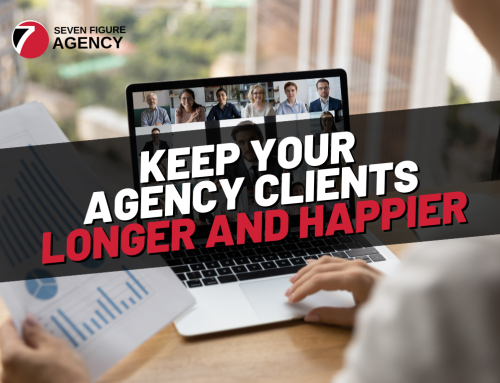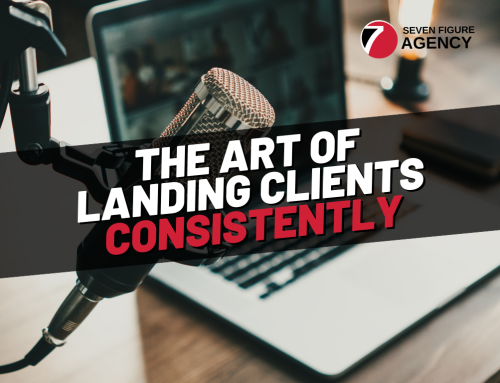Podcast: Embed
In this episode, we’ve got Justin Rondeau from Invisible PPC, who’s helped countless businesses achieve massive success with their PPC campaigns. He has been in the game for years and knows the ins and outs of PPC, like the back of his hand.
You’ll discover Justin’s top strategies for amplifying your PPC results and driving maximum ROI for your clients. He’ll also share tips and tricks to help you take your PPC campaigns to new heights.
So, whether you’re a seasoned pro or just starting out with PPC, you don’t want to miss this one! You can watch the full interview now below:
Outline of This Episode
- [0:45] Learn more about Justin and Invisible PPC
- [1:49] Tips to generate PPC results for clients
- [6:08] How to track phone and chat conversions
- [9:25] Key things an ad manager should track
- [14:02] Performance Max versus Smart Campaigns
- [18:36] What should a local business do with Google ads?
- [24:08] How to track conversions without back-end access
- [27:08] Why B2B and B2C strategies should be different
- [29:50] What traffic is necessary to see success with retargeting?
- [32:35] How seasonal companies should run ad campaigns
- [38:21] Only run ads during your client’s business hours
- [39:53] How Invisible PPC is working to become top 5%
- [41:33] Invisible PPC’s onboarding process
- [43:32] How to engage Invisible PPC as a white-label provider
- [45:28] What clients should consider charging for PPC
- [47:37] Do you use Google Search Partners in campaigns?
- [48:13] Do you drive branded keywords to a landing page or home page?
- [49:06] Justin shares the best way to set up landing pages
- [53:50] Why you shouldn’t scale a campaign too quickly
- [55:35] Why you should bill the client for the ad management not spend
Justin’s tips to generate PPC results for clients
Make sure you’re checking your conversion tracking—it’s the easiest place to screw things up. You can’t attribute the wrong conversion action to the action that’s occurring. Google will only give you back the information you provide.
You can’t associate a conversion action with a click if the click isn’t actually a conversion. Why? It sends a signal to Google that you want more of that click action, which will spend your money, dilute your audience, and drive no returns.
What else do you need to think about? The fundamentals. Measure campaigns based on your goals (generating leads, sales, etc.). Match the content and offerings to that. Don’t measure the success of a traffic-generating campaign by the number of sales it brings in during the first 30 days.
You also need dedicated landing pages for everything. A landing page needs to be focused to convert sales. Make sure that there’s consistency between the landing page and the ads.
The wonderful thing about Google is that it allows you to set times for when you want to run ads. Take advantage of that. The last thing you want is someone to call your clients when no one can answer the phone.
If PPC is outside your core competency, find someone else to do it. They’ll do it faster and right. Invisible PPC is an amazing white label partner to consider.
How to track phone and chat conversions
Use the 3rd party tools available to track whether or not your ads are converting leads from phone calls and chats. It’s hard to justify that a sale was from the work you put in if you don’t track these metrics. The tools are specialized to do the work for you. There are many opportunities for things to go wrong so you have to stay on top of it. Nothing is “Set it and forget it.” You need checks and balances in place.
Key things an ad manager should track to optimize campaigns
What should you check daily?
- Run through a checklist of search terms: Are any search terms triggering ads they shouldn’t be? Exact match isn’t as exact as it used to be. Protect your client’s budget.
- Look at bid adjustments. Does it make sense to scale out?
Proactive optimizations should be happening weekly. Use a dashboard and look at visibility, engagement, and conversions. Associate costs will all of those things to learn where you need to work. If conversions are down, troubleshoot what’s going wrong.
Does the landing page need to be edited? If there’s an engagement problem, test different ad copy. Visibility is tough. What can you do that won’t sacrifice end conversions? Any time you make a change—after identifying an area of opportunity—look at the ripple effect. How do you get to where you need to be?
When should you use Performance Max versus Smart Campaigns? Listen to hear Justin’s thoughts!
What should a local business do with Google ads?
Local businesses should focus on search and retargeting. Search will be more expensive. Make sure that your clients understand the economics. Secondly, run branded campaigns (your brand name) and brand subsidized campaigns (your brand name plus another keyword). True non-branded keywords will be the most expensive (generic terms, like “plumbing”).
You can even compete on competitors’ brand names, especially if people are searching for them. Retargeting and running remarketing campaigns will always be your cheapest traffic. If you have the traffic, retargeting is always a great thing that works.
Listen to find out how using a competitor’s keywords can be a great way to convert leads. (HINT: It requires training your client on how to handle calls).
Invisible PPC’s onboarding process
When a client signs up with Invisible PPC, they’re given an account manager. The client must fill out a lengthy form giving them access to everything needed to succeed. They also have the client answer necessary questions.
Once that’s completed, the new client will jump on a call with their account manager. Before this call, the team will start to look at competitive analysis, campaign structures, etc. If you’re a local service niche, a lot of that work has already been done. They have a database for keywords, add/swipe copy, landing page templates, etc.
After the onboarding call, they gather any remaining necessary information. They share what to expect and the offer they’d recommend. Then they get to work. Justin notes that it takes six business days to write ads, build a landing page, design display ads, set up call tracking, verify conversion tracking, and set up a dashboard.
What should you consider charging for PPC?
What should you consider charging for PPC? Justin recommends 2–4x what you pay your white label provider. Justin charges a fee of $595 per client. Justin recommends charging 1–3x for management fees (they charge $495 per month and up to $5,000 in ad spend). If you’re in a higher-paying niche you can definitely charge more. As long as you’re getting results they’re more than happy to pay. Don’t go below 1.5x so you can still cover your costs.
Do you use Google Search Partners in campaigns? Do you drive branded keywords to a landing page or home page? What’s the best way to set up landing pages? Justin answers so many questions in this session. Do not miss it!
Resources & People Mentioned
Connect with Justin Rondeau
Connect With Josh Nelson
- Josh’s Coaching Page on Facebook
- The Agency Success Facebook Group
- www.SevenFigureAgency.com
- Seven Figure Agency on YouTube
- Josh on Twitter: @joshnelsonimc
- Josh on LinkedIn
Subscribe to The Seven Figure Agency
on Apple Podcasts, on Android, on Google Podcasts, RSS
Join Our Digital Marketing Agency Success Group on Facebook
Connect with 15,000+ other digital marketing agency owners. Share tips, ideas, and strategies for growing and scaling your Digital Marketing Agency. Click Here To Join The Facebook Group.
Watch Agency Success Interviews
Listen to interviews with highly successful Agency Owners on how they grew their business with our Agency Success Interview Series.




